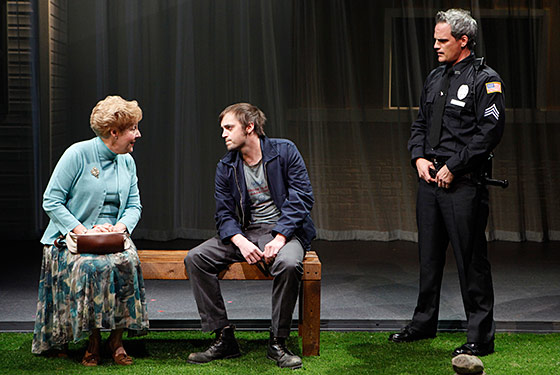
Middles of every variety are irresistible petri dishes for the absurd. Middle America, middling lives, “the middle distance” (a phrase Edward Albee lip-smackingly macerated in his latest, Me Myself & I): Nothing beckons the Beckettian like the gaping promise of empty space. (Luckily, it’s still this nation’s top export.) The suspension of a body, or a country, or a cosmos, between two poles that are themselves increasingly obscure and abstract and arbitrary, the closer one looks at them — that’s a gleaming beacon for the pomo wanderer. So it’s no surprise that Will Eno, author of the celebrated shoegazer monologue Thom Pain (based on nothing), has pitched his tent in the vast, empty American Middle.
In Middletown, there’s plenty of room for him to stretch out, and stretch out he does: Two full acts of Spoon River–esque monologues and dialogues-that-might-as-well-be-monologues, staged between two anonymously ugly suburban dwellings and in similarly anomie-scented wastes: a hospital, a library, a parking lot. Director Ken Rus Schmoll and set designer David Zinn seem intent on using symmetry and drabness as a kind of weapon against your stereoscopic vision: It’s hard to find a point of focus, probably because there isn’t one. This is an American nowhere after all, a Magic Eye poster that stubbornly won’t reveal its mysteries — or never had any to begin with.
Relax: Eno’s not snide or cheap enough to turn this into a series of Costco jokes. He merely believes passionately and despairingly in the unbridgeable distances between people, and he punctuates those distances with pinprick jokes, oft-brilliant semantic deconstructions that ring of Groucho Marx and George Saunders and all the great romantic pessimists. The results are numerous but arid koan jokes that tweet out into an endless black vacuum. Middletown isn’t a play. It’s a place. And there’s nothing there. Get it? If your answer is “no,” then this might not be your ideal evening’s entertainment.
The show opens with a truly spectacular curtain speech, a breathless three-minute wilkommen from a Public Speaker (David Garrison), the purpose of which, after eternities of inclusive language, is merely to point out the fire exits. So far, so good. What follows, though, is more of the same. The librarian (Georgia Engel, she of the Georgette Baxter baby voice and the can’t-miss comic timing) gives us some quick town history, of which there is none: “Middletown was built on the ruins of other, older Middletowns, and before them, a town called Middenton, which was named for being between two other places, both unknown and now incidentally gone.” We’re informed that the locale’s best features are its “excellent clouds” and “mostly silent nights,” not to mention a sweetly vapid resident astronaut (Garrison again). When a slightly lost newcomer, Mrs. Swanson (Heather Burns), asks for a library card, Engel replies, “Good for you, dear. I think a lot of people figure, ‘Why bother? I’m just going to die anyway.’”
This is sharp stuff, but I must say, it fades fast. The elliptical power of Thom Pain was in its focus, its angry, insult-comedy approach to alienation, fear of death, and the tissue-paper disappointments of mere Being. But there’s no anger in Middletown, because anger, after all, might require some sort of connection with another entity, and this is a place mostly without connections; the characters that do overlap are instantly deconstructed for doing so. (Eno’s arranged a clever, perhaps too clever little mid-play self-commentary.) When Mrs. Swanson opens a dialogue with the lonely John Dodge (Law & Order’s Linus Roache), the energy onstage goes dead: We know Eno can’t allow them to become involved on any meaningful level. The show’s orthodoxies are already plain — and a little dour, I must say, for such a funny writer. But Eno’s not letting these people near each other, unless it’s for a brief strangulation. Thom Pain had his hated audience, but Middletown has nothing: It’s communicating with a dead pulsar, pinging little bleated distress calls against the far wall of the universe, and waiting for an echo that never arrives.
What it does have is fear — the tedious, ambient fear we now take for granted. Dying an animal death is the great terror here, perhaps the last passion Eno leaves us. But when the irreducible moment of truth finally arrives, it’s oddly anticlimactic, like everything else in Middletown — and in Middletown. “I guess this is a real irony,” says John Dodge, from his hospital bed. “Me being here. How I got here.” “Irony is a people thing,” replies his doctor (Johanna Day), “Nature is very frank.” So is Eno, though frank can verge on glib, even cute. “I think we’re born with questions, and the world is the answer,” says the librarian, and visions of Jetta-ready bumper stickers dance in our heads. But that’s Middletown: a series of dazzling slogans for oblivion. George Saunders once wrote that “American villainy is our chronic failure to engage.” Eno doesn’t really believe in villainy, but one wishes, at times, that he believed a little harder in engagement.




